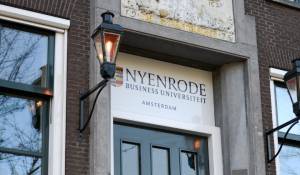Learn more about our International MBA Accelerated, a course that offers a global vision in a emergent market and multicultural experiences. Take a look at professor's Samantha Mazzero video: activity:6463414034422075392" rel="nofollow">https://www.linkedin.com/feed/update/urn![]() activity:6463414034422075392
activity:6463414034422075392
International MBA - FIA Business School
Posted Dec 08, 2018 13:56
Posted Aug 07, 2019 20:11
I have a few questions:
- is it possible to get through the program without a substantial knowledge of Portuguese? (not just the classes, which I know are in English, but navigating the city, business relationships, etc.)
- what are the job possibilities after this MBA?
- are scholarships available for international students?
[Edited by switcherooo on Aug 07, 2019]
- is it possible to get through the program without a substantial knowledge of Portuguese? (not just the classes, which I know are in English, but navigating the city, business relationships, etc.)
- what are the job possibilities after this MBA?
- are scholarships available for international students?
Posted Aug 07, 2019 22:27
I have a few questions:
- is it possible to get through the program without a substantial knowledge of Portuguese? (not just the classes, which I know are in English, but navigating the city, business relationships, etc.)
- what are the job possibilities after this MBA?
- are scholarships available for international students?
Hello!
Thank you for your questions, which I will answer below:
São Paulo is a huge city, and depending on the part, you will find more or less people who speak English. In general, services workers, who come from low-income families don't speak it, so for example, if you ask for directions to the fare colector on the bus, he/she probably will not be able to help. Same if you ask for information to people on the street. They will try to help you, but most likely than not they will try to mime, not really talk.
The good thing is that there plenty of apps available that can help you navigate through the city. We also offer 6 Portuguese lessons, to help our students in the first weeks of the program.
Regarding the job opportunities in Brazil, because not many people here speak English, most companies will only hire professionals who speak portuguese. We have an outplacement program, in which we divulge the interested student CV to other students and alumni, in order to help him or her find a position, but students who speak at least a little portuguese have better chances. Of course, we can't guarantee the the students WILL find a job.
International students who go back to their country after the program, have no problem going back to work, as FIA is accredited by the Association of MBAs, which is recognized in many countries around the world. The experience in a different economy, with a different culture will also give a new set of tools to be used in the labour market.
About scholarships, FIA offers a 25% discount to students coming from countries with GDP per capta lower than Brazil's.
I think I answered your questions, but if want any more information, you can contact us via e-mail: [email protected] or Skype: fia-mba-brazil
- is it possible to get through the program without a substantial knowledge of Portuguese? (not just the classes, which I know are in English, but navigating the city, business relationships, etc.)
- what are the job possibilities after this MBA?
- are scholarships available for international students?[/quote]
Hello!
Thank you for your questions, which I will answer below:
São Paulo is a huge city, and depending on the part, you will find more or less people who speak English. In general, services workers, who come from low-income families don't speak it, so for example, if you ask for directions to the fare colector on the bus, he/she probably will not be able to help. Same if you ask for information to people on the street. They will try to help you, but most likely than not they will try to mime, not really talk.
The good thing is that there plenty of apps available that can help you navigate through the city. We also offer 6 Portuguese lessons, to help our students in the first weeks of the program.
Regarding the job opportunities in Brazil, because not many people here speak English, most companies will only hire professionals who speak portuguese. We have an outplacement program, in which we divulge the interested student CV to other students and alumni, in order to help him or her find a position, but students who speak at least a little portuguese have better chances. Of course, we can't guarantee the the students WILL find a job.
International students who go back to their country after the program, have no problem going back to work, as FIA is accredited by the Association of MBAs, which is recognized in many countries around the world. The experience in a different economy, with a different culture will also give a new set of tools to be used in the labour market.
About scholarships, FIA offers a 25% discount to students coming from countries with GDP per capta lower than Brazil's.
I think I answered your questions, but if want any more information, you can contact us via e-mail: [email protected] or Skype: fia-mba-brazil
Posted Aug 07, 2019 22:53
Well, the information about the language barrier / job opportunities is honest, the degree is accredited, and 17k euro is reasonable price for accredited degree. Bonus that Brazil is great place
Related Business Schools
Other Related Content
Latin America Holds its Own as an MBA Study Destination
Article Dec 31, 2019
Overseas students want to gain a deeper understanding of the local business climate and customs, but the economic and political environments are challenging
Hot Discussions
-
Online MBA
Nov 12, 2024 3,232 26 -
Kozminski vs SGH
Oct 26, 2024 145 10 -
Question about some Masters- ESCP or EDHEC or Cranfield.
Oct 30, 2024 125 7 -
Gut check
Nov 11, 2024 106 4 -
Why do US schools like to hide their tuition fees?
Nov 09, 2024 98 4 -
Time management when pursuing an MBA while working
Oct 31, 2024 79 4 -
OHM MBA in Germany
Nov 06, 2024 77 4 -
LBS vs Oxford, move into the UK
Nov 14, 2024 92 2




